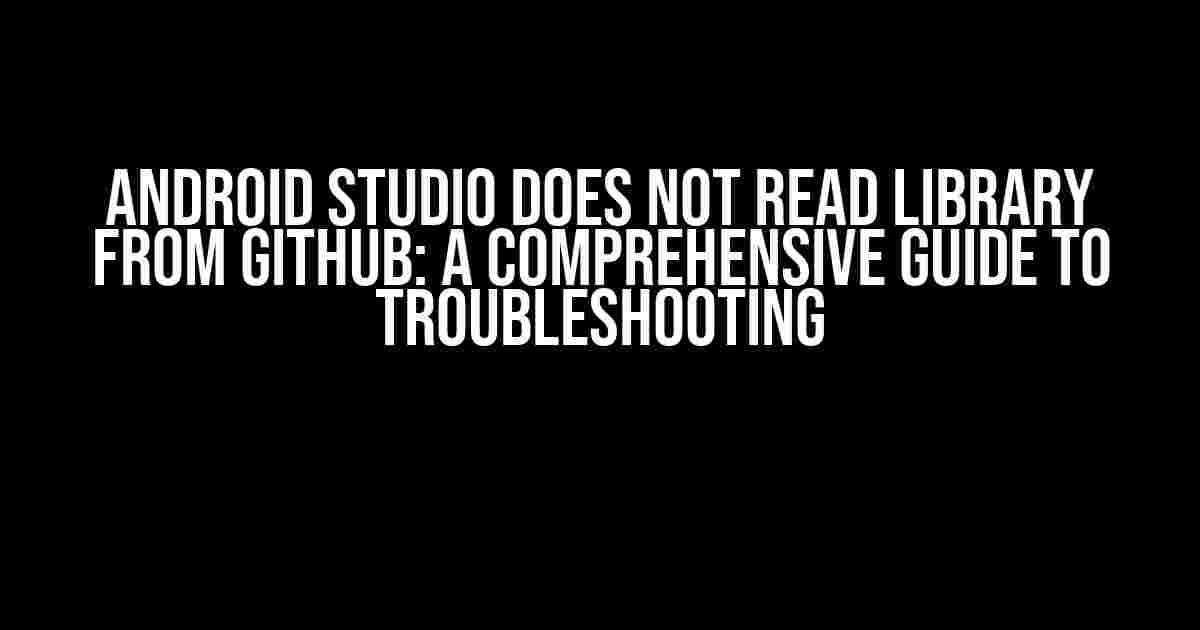Are you tired of encountering issues with Android Studio not recognizing libraries from GitHub? You’re not alone! In this article, we’ll delve into the common causes of this problem and provide you with a step-by-step guide on how to troubleshoot and resolve the issue.
Understanding the Problem
When you try to add a library from GitHub to your Android project, Android Studio should automatically recognize and import the library. However, sometimes, this process can fail, leaving you with error messages and a non-functional project.
Common Causes of the Issue
.gradlefiles not properly configured- GitHub repository not properly linked
- Dependency issues with other libraries
- Android Studio cache issues
- Incorrect library version or compatibility
Step-by-Step Troubleshooting Guide
Let’s break down the troubleshooting process into manageable steps. Follow along to resolve the issue and get your project up and running!
Step 1: Check the .gradle Files
// Check your build.gradle (project) file
buildscript {
repositories {
jcenter()
mavenCentral()
}
dependencies {
classpath 'com.android.tools.build:gradle:4.0.0'
}
}
allprojects {
repositories {
jcenter()
mavenCentral()
}
}
Make sure your build.gradle file is correctly configured. Verify that the repositories section includes jcenter() and mavenCentral(), and that the Android Gradle plugin version is compatible with your Android Studio version.
Step 2: Verify the GitHub Repository Link
Double-check that the GitHub repository URL is correctly formatted and points to the correct library.
// Check your build.gradle (module) file
dependencies {
implementation 'com.example.library:library-name:1.0.0'
}
Verify that the library dependency is correctly declared in your build.gradle file. Make sure the version number matches the one in the GitHub repository.
Step 3: Check for Dependency Issues
Dependency conflicts can cause issues with library imports. Check your build.gradle file for any conflicting dependencies.
// Check for conflicting dependencies
dependencies {
implementation 'com.example.library:library-name:1.0.0'
implementation 'com.example.conflicting-library:conflicting-library-name:1.0.0'
}
Remove or update conflicting dependencies to resolve the issue.
Step 4: Invalidate Android Studio Cache
Sometimes, Android Studio’s cache can become outdated or corrupted, causing issues with library imports. Try invalidating the cache and restarting Android Studio.
- Go to
File>Invalidate Caches/Restart - Click
Invalidate and Restart
Wait for Android Studio to restart and re-index your project.
Step 5: Check Library Version and Compatibility
Verify that the library version is compatible with your Android project.
| Library Version | Android Version | Compatibility |
|---|---|---|
| 1.0.0 | 21+ | Compatible |
| 2.0.0 | 24+ | Incompatible |
Check the library’s documentation to ensure it’s compatible with your Android project’s version.
Additional Troubleshooting Tips
If the above steps don’t resolve the issue, try the following:
- Check the library’s GitHub repository for any issues or known problems
- Try cleaning and rebuilding your project (
Build>Rebuild Project) - Disable and re-enable the library in your project
- Check for any firewall or network connectivity issues that might be blocking the GitHub repository
Conclusion
Troubleshooting Android Studio’s issues with reading libraries from GitHub can be a frustrating experience. However, by following these step-by-step instructions and tips, you should be able to resolve the issue and get your project up and running.
Remember to stay patient, persistent, and methodical in your troubleshooting approach. Happy coding!
Keywords: Android Studio, GitHub, library, troubleshooting, Gradle, dependencies, cache, compatibility
Here are the 5 Questions and Answers about “Android Studio does not read library from GitHub” in HTML format with a creative voice and tone:
Frequently Asked Question
Got stuck with Android Studio not reading libraries from GitHub? Relax, you’re not alone! Here are some frequently asked questions to help you troubleshoot the issue.
Why does Android Studio not recognize the library from GitHub?
Hey, calm down! This might be due to the fact that you haven’t properly added the library to your project. Make sure you’ve added the library to your `build.gradle` file and synced your project. Also, check if the library is compatible with your Android Studio version.
How do I add a GitHub library to my Android Studio project?
Easy peasy! You can add a GitHub library to your project by adding the library’s GitHub repository URL to your `build.gradle` file. For example, `implementation ‘com.github.username:library-name:version’`. Then, sync your project and voilà! The library should be added to your project.
What if I’ve added the library correctly, but Android Studio still doesn’t recognize it?
Hmmm, that’s weird! In this case, try invalidating the cache and restarting Android Studio. Sometimes, Android Studio just needs a little nudge to recognize new libraries. You can also try deleting the `.gradle` folder and rebuilding your project.
Can I use a local copy of the library instead of fetching it from GitHub?
Yeah, you can! If you have a local copy of the library, you can add it to your project by creating a `libs` folder in your project directory and adding the library’s JAR file to it. Then, add the library to your `build.gradle` file using `implementation files(‘libs/library-name.jar’)`.
What if I’m still stuck and Android Studio refuses to read the library?
Don’t worry, we’ve all been there! If none of the above solutions work, try searching for answers on Stack Overflow or the Android Studio issues page. You can also try asking a question on the Android Developers community forum or seeking help from a friend who’s more familiar with Android Studio.
I hope this helps!




